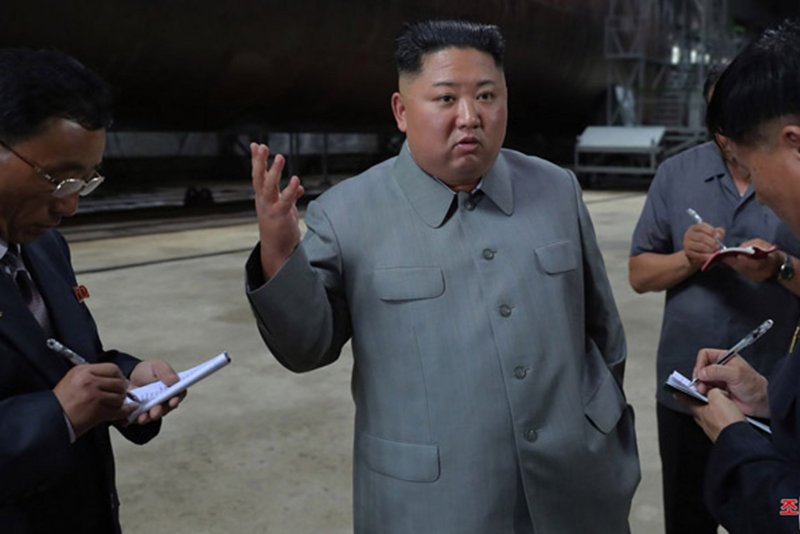This image, released on July 23 by the North Korean Official News Service (KCNA), shows North Korean leader Kim Jong Un inspecting a newly built submarine. File Photo by KCNA |
License Photo
SEOUL, Dec. 6 (UPI) -- As a year-end deadline imposed by North Korea looms over stalled nuclear negotiations with the United States, the heated rhetoric and insults of an earlier era re-emerged this week, as a Pyongyang official said that remarks by U.S. President Donald Trump may be a sign of a "relapse into the dotage of a dotard."
Trump had raised the specter of a military action and revisited his "Rocket Man" description of North Korean leader Kim Jong Un on Tuesday while attending a NATO event in Britain.
"He definitely likes sending rockets up, doesn't he? That's why I call him 'Rocket Man,'" Trump said. "We have the most powerful military we've ever had, and we're by far the most powerful country in the world. And, hopefully, we don't have to use it, but if we do, we'll use it."
In response, North Korean First Vice Foreign Minister Choe Son Hui said Thursday that Trump's remarks showed "no courtesy when referring to the dignified supreme leadership of the DPRK." The Democratic People's Republic of Korea is the official name of North Korea.
"This has prompted the waves of hatred of our people against the U.S. and the Americans and they are getting higher and higher," she said in a statement carried by the state-run Korean Central News Agency.
"If any words and expressions stoking the atmosphere of confrontation are used once again on purpose at this crucial moment, it must really be diagnosed as the relapse of the dotage of a dotard," she added, using an insult Kim first hurled at Trump in 2017.
Trump frequently referred to Kim as "Rocket Man" in speeches and on Twitter during the early months of his administration when tensions between Pyongyang and Washington were running high, threatening North Korea with "fire and fury like the world has never seen" in August 2017 and saying he would "totally destroy" the country in his first speech to the United Nations the next month.
In response, Kim called Trump a "frightened dog" and a "dotard," a term for a senile elderly person.
Relations improved in 2018, leading to the historic Singapore summit between Trump and Kim in June of that year, which resulted in an agreement which called on North Korea to denuclearize and for both sides to build a "lasting and stable peace regime on the Korean Peninsula."
However, the two sides have remained far apart on the details, with Pyongyang seeking sanctions relief in exchange for taking steps toward dismantling its nuclear arsenal and Washington holding out for complete denuclearization.
A second summit in February of this year in Hanoi, Vietnam ended abruptly without an agreement and negotiations have been at a stalemate since.
North Korea returned to testing missiles after the failed summit, including launches of a ballistic missile based on the highly maneuverable Russian Iskander as well as a new submarine-launched ballistic missile.
Its most recent launch came at the end of November, with two missiles fired from what the North described as a test of a "super-large multiple-rocket launcher."
North Korea has imposed a deadline of the end of the year for the United States to come up with a new proposal in its negotiations, and Pyongyang has been sending signals that it is shifting toward a more provocative stance for 2020.
On Wednesday, Kim toured revolutionary battle sites on Mount Paektu on horseback, accompanied by senior military officials, and spoke of the need "to get prepared for the harshness and protracted character of our revolution," KCNA reported.
On the same day, the North announced that it would hold a meeting of senior officials in late December "to discuss and decide on crucial issues in line with the needs of the development of the Korean revolution and the changed situation at home and abroad."















